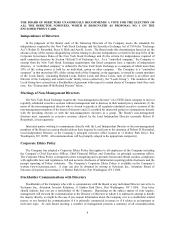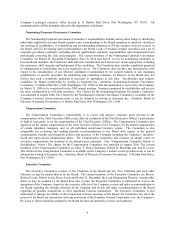CompUSA 2007 Annual Report Download - page 19
Download and view the complete annual report
Please find page 19 of the 2007 CompUSA annual report below. You can navigate through the pages in the report by either clicking on the pages listed below, or by using the keyword search tool below to find specific information within the annual report.14
KL2 2553275.3
governance, and motivating executive officers to manage the Company in a manner that will enhance the
Company’s growth and financial performance for the benefit our stockholders, customers and other constituencies.
Compensation of the Company’s executive officers is determined based primarily upon an evaluation of
Company performance as it relates to three general business areas:
• Operational and Financial Performance (utilizing standard metrics such as net sales, operating
income, gross margin, earnings per share, working capital, stockholder equity and peer group
comparisons);
• Strategic Accomplishments (including growth in the business and in the value of the Company’s
assets); and
• Corporate Governance and Oversight (encompassing legal and regulatory compliance and
adherence to company policies including the timely filing of periodic reports with the SEC, the
Sarbanes-Oxley Act, employment and safety laws and regulations and the Company’s corporate
ethics policy).
In determining the compensation of a particular executive, consideration is given to the specific corporate
responsibilities that executive is charged with as they relate to the foregoing business areas.
Elements of Our Executive Compensation Programs
To promote the objectives described above, our executive compensation programs typically consist of the
following principal elements:
• Base salary;
• Cash bonuses;
• Stock–based incentives (other than for the Chairman/CEO and the two Vice Chairman of the
Company who are considered majority stockholders of the Company); and
• Benefits, perquisites and other compensation.
Base Salary - Salary levels generally are determined based on individual and Company performance as well as a
subjective assessment of prevailing levels among the Company’s competitors.
Cash Bonuses - In establishing annual bonuses, the Company considers such factors relating to the Company’s
overall performance and assigns such weight to each such factor as it, in its discretion, deems appropriate. The
Company may also consider its assessment of each individual’s contribution to the Company’s performance. If
stockholders approve Proposal 2, the Company will determine cash bonuses to its most highly compensated officers
pursuant to the Systemax Executive Incentive Plan.
Stock–Based Incentives - Stock-based incentives, at the present time consisting of (a) stock options granted at 100%
of the stock’s fair market value on the grant date and/or (b) restricted stock units granted subject to certain
performance conditions, constitute the long-term portion of the Company’s executive compensation package. Stock
options provide an incentive for executives to manage the Company with a view to achieving results which would
increase the Company’s stock price and, therefore, the return to the Company’s stockholders. The number and
timing of stock option grants are decided in part based on the Company’s subjective assessment of prevailing levels
of similar compensation among the Company’s competitors. Stock option and restricted stock unit grants must be
approved by the Compensation Committee of the Board, or, with respect to grantees who are not officers or
directors, by the Compensation Committee’s designee. Richard Leeds (Chairman and CEO), Bruce Leeds (Vice
Chairman) and Robert Leeds (Vice Chairman) do not receive stock options or other stock–based incentives as part
of their compensation. The Messrs. Leeds are members of a family group that together owns more than 60% of the
stock of the Company.
























